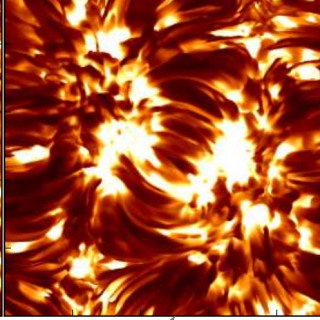Bibcode
Zeuner, Franziska; del Pino Alemán, Tanausú; Trujillo Bueno, Javier; Solanki, Sami K.
Referencia bibliográfica
The Astrophysical Journal
Fecha de publicación:
3
2024
Revista
Número de citas
5
Número de citas referidas
4
Descripción
Solar magnetic fields alter scattering polarization in spectral lines like Sr I at 4607 Å via the Hanle effect, making it a potential diagnostic for small-scale, mixed-polarity photospheric magnetic fields. Recently, observational evidence for scattering polarization in the Sr I 4607 Å line at the solar disk center was found. Here, we investigate the reliability of the reconstruction method that made possible this detection. To this end, we apply it to linear polarization profiles of the Sr I 4607 Å line radiation emerging at the disk center obtained from a detailed 3D radiative transfer calculation in a magneto-hydrodynamic (MHD) simulation snapshot with a small-scale dynamo contribution. The reconstruction method systematically reduces the scattering amplitudes by up to a factor of 2, depending on the noise level. We demonstrate that the decrease can be attributed to two systematic errors: first, the physical constraint that underlies our assumptions regarding the dependence of scattering polarization on the quadrupolar moment of the radiation field; and second, the limitations of our method in accurately determining the sign of the radiation field tensor from the observed intensity image. However, by consistently applying the reconstruction process and after taking into account image-degradation effects due to the temporally variable image quality, such as imposed by seeing, the observed and synthesized polarization signals show remarkable agreement. We thus conclude that the observed scattering polarization at the solar disk center is consistent with that emerging from a MHD model of the solar photosphere with an average magnetic field of 170 G at the visible surface.
Proyectos relacionados

Magnetismo, Polarización y Transferencia Radiativa en Astrofísica
Los campos magnéticos están presentes en todos los plasmas astrofísicos y controlan la mayor parte de la variabilidad que se observa en el Universo a escalas temporales intermedias. Se encuentran en estrellas, a lo largo de todo el diagrama de Hertzsprung-Russell, en galaxias, e incluso quizás en el medio intergaláctico. La polarización de la luz
Ernest
Alsina Ballester